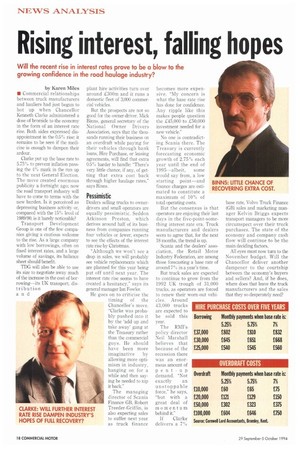Rising interest, falling hopes
Page 20

If you've noticed an error in this article please click here to report it so we can fix it.
Will the recent rise in interest rates prove to be a blow to the growing confidence in the road haulage industry?
by Karen Miles • Commercial relationships between truck manufacturers and hauliers had just begun to hot up when Chancellor Kenneth Clarke administered a dose of bromide to the economy in the form of an interest rate rise. Both sides expressed disappointment in the 0.5% rise: it remains to be seen if the medicine is enough to dampen their ardour.
Clarke put up the base rate to 5.75° to prevent inflation passing the 4° mark in the run up to the next General Election. The move created enormous publicity a fortnight ago; now the road transport industry will have to come to terms with the new burden. Is it perceived as depressing business activity or, compared with the 15% level of 1989/90, is it barely noticeable?
Transport Development Group is one of the few companies giving a cautious welcome to the rise. As a large company with low borrowings, often on fixed interest rates, and a large volume of savings, its balance sheet should benefit.
TDG will also be able to use its size to negotiate away much of the increase in the cost of borrowing—its UK transport, distribution and
plant hire activities turn over around £300m and it runs a domestic fleet of 3,000 commercial vehicles.
But the prospects are not so good for the owner-driver. Mick Binns, general secretary of the National Owner Drivers Association, says that the thousands running their business on an overdraft while paying for their vehicles through bank loans, Hire Purchase, or leasing agreements, will find that extra 0.500 harder to handle: "There's very little chance, if any, of getting that extra cost back through higher haulage rates," says Rinns.
Pessimistic peak', selling trucks to ownerdrivers and small operators are equally pessimistic. Seddon Atkinson Preston, which derives around half of its business from companies running four vehicles or fewer, expects to see the effects of the interest rate rise by Christmas.
"Although we won't see a drop in sales, we will probably see vehicle replacements which are planned for this year being put off until next year. The interest rate rise seems to have created a hesitancy," says its general manager Ian Fowler.
He goes on to criticise the timing of the Chancellor's move. "Clarke was probably pushed into it by the 'add up and take away' gang at the Treasury rather than the commercial guys. He should have been more imaginative by allowing more optimism in industry, hanging on for a while and then saying he needed to nip it back."
The managing director of Scania Finance GB, Robert Treeder-Griffin, is also expecting sales to suffer next year as truck finance becomes more expensive. "My concern is what the base rate rise has done for confidence. Any ripple like this makes people question the £45,000 to 150,000 investment needed for a new vehicle."
No one is contradicting Scania there. The Treasury is currently forecasting economic growth of 2.75% each year until the end of
1995—albeit, some would say from, a low starting point—and finance charges areestimated to constitute a maximum of 10% of total operating costs.
But the consensus is that operators are enjoying their last days in the five-point-something interest rate era. Truck manufacturers and dealers seem to agree that, for the next 18 months, the trend is up.
Scania and the dealers' association, the Retail Motor Industry Federation, are among those forecasting a base rate of around 7% in a year's time.
The RMI's policy director Neil Marshall believes that because of the recession there mous amount of demand. "Not
exactly an unstoppable force," he says, "but with a great deal of momentum behind it."
If Clarke delivers a 7%
base rate, Volvo Truck Finance (GB) sales and marketing manager Kelvin Briggs expects transport managers to be more circumspect over their truck purchases. The state of the economy and company cash flow will continue to be the main deciding factors.
All eyes must now turn to the November budget. Will the Chancellor deliver another dampener to the courtship between the economy's buyers and sellers? And, if he does, where does that leave the truck manufacturers and the sales that they so desperately need?




























































































